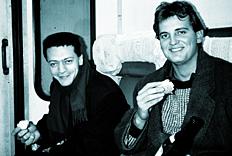Destined for a gory Christmas via Transylvania
A FEW days before Christmas 1989, a request arrived to head for Bucharest to cover the seeds of potential revolution.

THE old News Limited bureau on Vauxhall Bridge Road at Pimlico, London, boasted shelves piled high with file copies of Rupert Murdoch's newspapers from Australia, a creaking lift, a suite of offices, and a couple of fax machines churning out story requests from our editors back home. The fax machines received our undivided attention.
A few days before Christmas 1989, a request arrived on the fax for one of the correspondents to head for Bucharest to cover the seeds of potential revolution. Romania and its ruling hardline Communist Party were unravelling. There had been angry street demonstrations and demands for the tyrannical ruler, Nicolae Ceausescu, to step down after 24 years of Stalinist dictatorship.
At 22, I was the youngest in the bureau when I arrived in June 1989, having never been farther offshore than Fraser Island and Guam.
I took a small atlas, trousered a wad of cash, copied a folder of clippings from The Times, printed the latest wire stories forecasting a bloody Romanian Christmas, packed a bag and boarded a flight at Heathrow.
My destination was Istanbul. OK, I overshot slightly. Romania's borders had been closed amid sporadic fighting and a spiral into revolution. The airspace was off limits.
For a day and a half I shuttled between Istanbul bazaars, coffee shops, travel agencies and the city's airport, trying to organise a passage into a country teetering on the brink.
As I passed abandoned check-in counters and airport screens showing every flight to Bucharest as cancelled, my luck changed. Nicolas Rothwell, The Australian's remarkable multilingual Europe correspondent, who had lived out of a suitcase through 1989 reporting from Poland, East Germany, Bulgaria and Hungary as the Eastern Bloc crumbled, passed by.
I clung on like a limpet as Rothwell organised flights from Istanbul to Budapest, negotiated a driver to take us through the night and the Hungarian countryside to the Romanian border, and tuned in to the BBC World Service's grave reports on the blood being spilled while Ceausescu and his loyalists battled to remain in power.
A Czechoslovakian Red Cross relief group let us join their convoy through the checkpoint. Shortly before noon on Christmas Eve, in the Romanian town of Arad, we boarded a train for Bucharest.
The BBC's hourly broadcasts were grim. There were reports of deaths in the hundreds, perhaps thousands. For lunch and dinner as the dilapidated, almost empty train chugged across Transylvania, we shared bread, cheese and Bulgarian wine, and made nervous small talk with our new-found friend, Peter Hitchens of Britain's Daily Express.
Fierce battles involving the military, the armed political police known as the Securitate, civilians and students were raging in Bucharest.
"Our train rumbled into Bucharest at about 11pm and almost immediately we were surrounded by armed students, most of whom knew somebody who had been killed in the fighting on the streets ... The dead were piling up in the city's morgues and hospitals," I wrote at the time. "The courage of the students ... was uplifting. Once outside, they put themselves between me and the most likely line of gunfire as we ran half-crouched towards the InterContinental Hotel. Throughout the night, the rat-tat-tat and shelling continued."
On Christmas Day, the students led me around the city, past makeshift shrines to the fallen, past patches of snow stained by blood, past the tanks, the headquarters of the megalomaniac Ceausescu, twitchy soldiers, and snipers' nests, and the charred remains of family cars and houses.
Late in the evening a jubilant announcer on Bucharest radio made a stunning declaration: "The Antichrist died on Christmas Day. Oh what wonderful news."
Having lost the military's support, Ceausescu and his wife, Elena, self-proclaimed father and mother of an impoverished people, had been accused of genocide and fraud in a secret trial. They were executed by firing squad as Elena screamed that her accusers could go to hell.
After years of misery and days of indiscriminate killing, confusion and fear, celebrations erupted. The scenes were deeply moving. I photographed and documented as much of it as possible. By December 30 the world's interest in the violent overthrow of the cobbler's apprentice cum communist president was waning.
We paid someone handsomely to drive us to the Bulgarian border. As Rothwell was unwell, I dragged our bags over the bridge above the Danube before continuing our journey through Bulgaria into Turkey and on to Istanbul for a return flight to the safety of New Year's Eve in London.
Hedley Thomas, a senior reporter for The Australian, returned from the London bureau in 1991.


